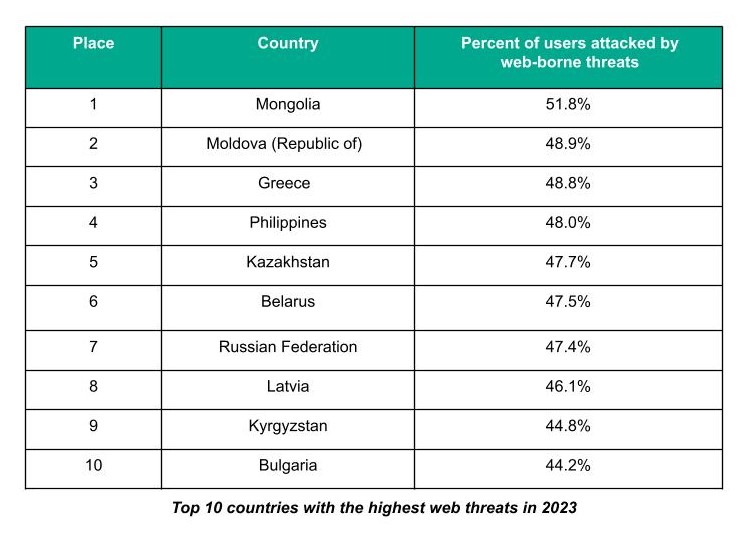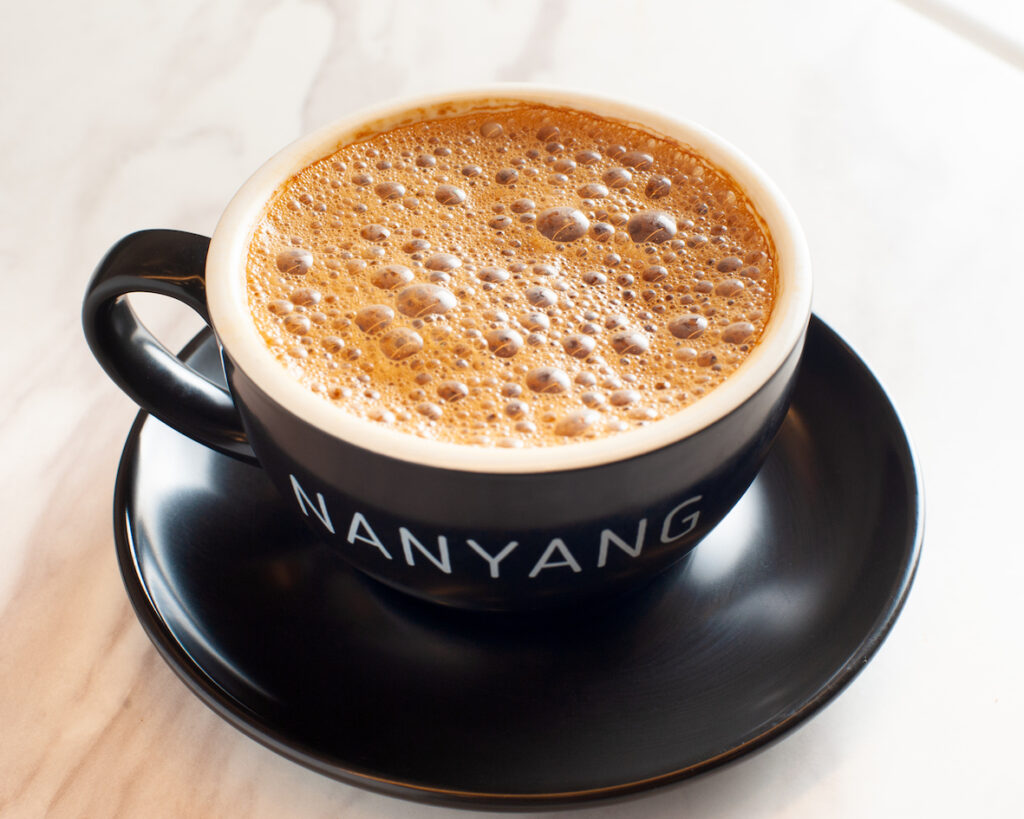COUNT
PH slides to top 4 in Kaspersky’s new global ranking of countries most targeted by online threats

February 5, 2024 9:46 p.m.
In 2023, web threats targeting the Philippines were about two percent less (48%) than in 2022 (49.8%), according to the latest Kaspersky Security Network (KSN) report.
With this new data, the country moved two spots down to fourth place worldwide among countries most targeted by malicious files from the internet and phishing websites. It looks like a positive development but Kaspersky is strongly advising against dropping the armor.
“There are two things that could explain the drop in web threats, albeit slightly. First is that we see the country is slowly making headway in cybersecurity. We classify the Philippines to be in the intermediate group of countries that are identifying cyberattacks and making efforts to implement rules. The second one and this we have to seriously take note, is that cybercriminals are continuously taking other attack routes that might be off the radar. One trend that we consistently have been seeing lately is their preference for targeted attacks instead of the spray and pray method,” said Yeo Siang Tiong, General Manager for Southeast Asia at Kaspersky.
“Complacency, however, is still not an option. Cybercriminals continue to develop their tools and techniques. They actually surprise cybersecurity experts all the time. Our mindset should be how to be able to hunt threats before they could cause harm and damage. At this point, I recommend that we should be talking more about threats as we proactively learn to detect and respond to them. This is where threat intelligence comes in handy,” added Yeo.
Web or online threats are attacks through browsers which are also cybercriminals’ tried and tested way to spread malware. It can easily be done with or without the involvement of the victim.
A web attack with victim participation is done through social engineering. The victim is tricked into doing something that jeopardizes their personal security or the security of the organization they work for. The objective is to get the victim to respond by clicking an infected email attachment, a compromised website, or responding to a fake unsubscribe notice, among others. Last year’s data breaches involving a government agency and an e-wallet company, which were each reportedly traced to phishing, are examples of this type of web threat.
An attack requiring no victim involvement is through drive-by downloads. By simply visiting a compromised website, their device gets infected automatically (and silently) particularly if they failed to apply a security update to one of their apps. This method is used in most web attacks.
In the recent global ranking, the Philippines came behind Mongolia (51.8%), Moldova (48.9%) and Greece (48.8%). Since 2019, the country has consistently been in the top 10 ranking countries.
Among Southeast Asian countries, the Philippines is trailed by Malaysia with the overall percentage of users attacked by web-borne threats from January to December 2023.
To stay protected, Kaspersky recommends users the following:
- Do not download and install applications from untrusted sources
- Do not click on any links from unknown sources or suspicious online advertisements
- Create strong and unique passwords, including a mix of lower case and upper case letters, numbers, and punctuation, as well as activating two-factor authentication
- Always install updates
- Ignore messages asking to disable security systems for office or cybersecurity solution
- Use a robust cybersecurity solution appropriate to your system type and devices
For organizations, Kaspersky recommends the following:
- Always keep software updated on all the devices to prevent attackers from infiltrating network by exploiting vulnerabilities
- Use strong passwords to access corporate services. Use multi-factor authentication for access to remote services
- Choose a proven endpoint cybersecurity solution for business that is equipped with behaviors-based detection and anomaly control capabilities for effective protection against known and unknown threats
- Use dedicated set of effective endpoint protection, threat detection and response products to timely detect and remediate even new and evasive threats
- Use the latest threat intelligence information to empower your security experts
COUNT
There’s a Nanyang near you for all your Singaporean food cravings

August 4, 2023 6:30 p.m.
Missing Singapore’s famous Hainanese Chicken Rice, Laksa fishball, Cheesy Chicken Chop Noodles and Kopi?
Visit your nearest Nanyang Philippines branch.





COUNT
Globe powers up TOYCON 2023’s landmark 20th year

June 29, 2023 6:53 p.m.
As Toycon Philippines proudly commemorates its 20th year, the landmark celebration promises to be more electrifying than ever with the formidable support of leading digital lifestyle brand Globe.
For the first time, Globe is the title sponsor of the iconic pop-culture event, bringing a new level of excitement and engagement to the toy collector and creator community.
Globe has always been at the forefront of supporting diverse subcultures and passions, and this partnership is a testament to its commitment. As part of the collaboration, Globe will bring to life the rich world of its cinematic and theatrical partners, further enriching the TOYCON 2023 experience for attendees.
“Globe is thrilled to collaborate with Toycon Philippines, especially on such a milestone year,” said Mike Magpily, VP, Head of Segment Strategy and Subcultures at Globe.
“As the country’s most reliable network and top digital solutions platform with an ecosystem of various services, we’re uniquely positioned to foster the vibrancy of the toy collecting and creating community. This partnership underscores our commitment to nurturing a wide array of passions and interests while ensuring the best connectivity for all participants.”
Cholo Mallillin, Marketing Head at Toycon Philippines, said: “The collaboration with Globe will further elevate the Toycon experience. This partnership will bring more surprises and rewards to our community. We invite everyone to join us as we celebrate 20 years of Toycon in the most exciting way possible.”
TOYCON 2023 will be held at the SMX Convention Center in MOA from July 7 to 9, 2023. Attendees are in for a treat, as they have the chance to meet their beloved childhood characters, explore an expansive marketplace of unique toys and collectibles, and participate in exclusive Globe activities.
One of the highlights of the partnership is a series of exclusive perks for Globe customers. By using Globe Rewards points, customers will have the opportunity to win various ticket tiers ranging from Day Passes to VIP Passes. There will also be exclusive toy freebies for VIP pass holders, and unique Globe-only activities, such as paint-your-own Gudi.
At the event, Globe will also host an interactive booth featuring activities designed to reward and inspire. From earning freebies by donating Rewards points to a good cause, to free arcade plays and meet-ups with popular streamers, Globe customers are in for an exciting weekend of gaming and beyond.
To keep up-to-date with all the exciting promotions and surprises at TOYCON 2023, Globe customers are encouraged to use the GlobeOne app.
To learn more about Globe, visit https://www.globe.com.ph/.
COUNT
Love the long weekend break? Cybercriminals do, too

April 4, 2023 5:11 p.m.
There are 18 official public holidays in the Philippines. As we all know, when these dates fall close to a weekend or if the government pursues holiday economics, most Filipinos make plans in advance to take advantage of extended holiday breaks. This year, we can get to do that at least 12 times.
Unfortunately, cybercriminals get excited about holidays, too. To refresh everyone’s memory, the $81-million Bangladesh Bank heist back in 2016 is an example of a successful cyber attack, which happened on the first day of Lunar New Year, a national holiday in the Philippines and the rest of Asia.
“Now that the world has reopened, travel is back with a vengeance this year, hence the term ‘travel revenge’. Whether Filipinos are scheduling holiday trips or just staycation-ing during the long weekends, it’s important to observe simple digital security practices so you can get to sit back and relax as you take your well-deserved vacation. Security-first thinking opens doors for a more enjoyable holiday break, especially for Filipinos who are amongst the world’s most active online users,” comments Chris Connell, Managing Director for Asia Pacific at Kaspersky.
Both individuals and companies are advised to be extra mindful of personal cybersecurity best practices and internet hygiene when on a holiday.
For companies, Kaspersky suggests to:
- Conduct drills
- Stress to vacationing employees why data encryption, two-factor authentication, strong passwords, and locking devices when not in use are important.
- Discuss the steps to take if their device ends up getting stolen.
- Advise staff about charging smartphones in a wall socket, not through USBs at airports and other public places (these can be used to steal data from a device and infect it with malicious software, such as spyware.
- Educate employees about the dangers of public WIFI (and even hotel WIFI unless it is encrypted and password-protected) and how to use a secure connection such as with a VPN.
- Log out
- Terminate unnecessary VPN connections to the corporate infrastructure.
- End unnecessary sessions that employees have left on any devices for an extended period of time. This also applies to corporate messengers, web apps and any other services.
- Check that the list of employees with access to the corporate network via VPN or RDP include only authorized users. Revoke access from those who don’t need it.
- Create special “emergency” admin accounts for potential incident response over the holidays. The rights granted to regular admin accounts can even be temporarily restricted so that attackers cannot exploit them.
- Install patches for all key applications. This process is far simpler if your company uses security solutions with a built-in patch management system.
Meanwhile, Kaspersky encourages individuals to:
- Only browse trusted apps and websites and be careful about personal information you input like credit card numbers or home address.
- Do not click on links or open email attachments from travel sites when receiving confirmations. Trusted companies include such letters in the bodies of their emails. Malware is often disguised as an attached confirmation letter.
- Bring two or three or more credit or debit cards to have a backup plan in case of loss or needing to cancel one.
- Never leave valuables unattended. Put large amounts of cash and mobile devices or laptops in the hotel safe.
- Use a credit card as most have built-in protections against fraud. There is no protection against a scammer if you send them cash or even check or debit card payment in some cases. A money transfer service is not advisable.
- Ensure their devices has security software installed, ideally with anti-theft technology.

















